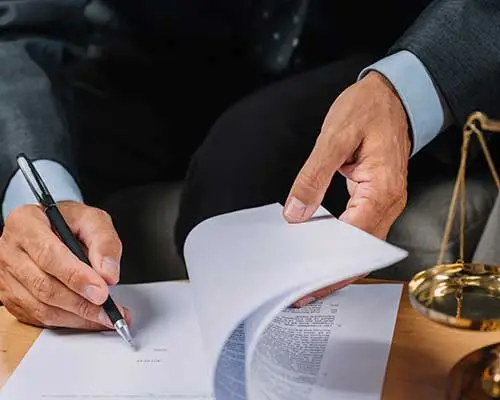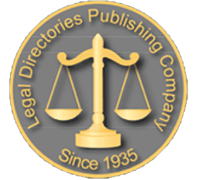How to Choose the Right Partnership Breakup Attorney
Starting a business with a partner is full of excitement and shared dreams. Ending that partnership, however, is a reality no one plans for. When disagreements over money, management, or the company’s future become impossible to resolve, the business you built together is put at risk. The path forward can seem unclear and filled with potential legal traps. This is the critical moment to bring in a professional. A skilled partnership breakup attorney can help you untangle the complexities, mediate disputes, and create a clear strategy for a fair separation, ensuring your financial interests are protected throughout the entire process.
Key Takeaways
- Don’t Go It Alone: A partnership breakup is a complex legal process. Hiring an attorney specializing in business litigation from the start is the most critical step to protect your assets, manage disputes, and ensure the dissolution is handled correctly under Florida law.
- Keep a Clear Paper Trail: Meticulous records are your strongest asset. Organize all financial documents, contracts, and communications to provide a factual basis for negotiations, which prevents arguments and ensures a fair division of assets and liabilities.
- Focus on Business, Not Feelings: Emotional decisions can lead to costly mistakes and prolonged conflict. Work with your attorney to create a logical exit strategy, focusing on objective facts and long-term financial outcomes rather than personal grievances.
How a Partnership Breakup Attorney Can Help
When a business partnership ends, it can feel like a personal and professional earthquake. The process is often emotionally charged and legally complex. Trying to manage it on your own can lead to costly mistakes and damaged relationships. This is where a partnership breakup attorney becomes your most valuable asset. They provide the objective guidance and legal expertise needed to dissolve the business properly, protect your interests, and help you move forward. An attorney ensures the entire process is handled correctly, from dividing assets to filing the final paperwork, so you can close this chapter with confidence and clarity.
Handling Core Legal Services
First and foremost, a partnership breakup attorney manages the essential legal mechanics of the dissolution. This isn’t just about deciding who gets the office furniture; it’s a formal process with specific legal requirements. Your attorney will carefully review your original partnership agreement to understand the established terms for a split. They will then draft a dissolution agreement that outlines every detail, from asset and debt division to the final closing date. They also handle all necessary filings with the state to officially dissolve the business entity. This expert oversight of your business litigation needs ensures every step is compliant with Florida law, protecting you from future liabilities and legal loose ends.
Resolving Disputes
It’s rare for business partners to agree on everything during a breakup. Disagreements over finances, client ownership, or even the reasons for the split can quickly escalate. An attorney acts as a neutral third party and a skilled negotiator to resolve these conflicts. They can help mediate discussions, keeping them productive and focused on solutions rather than emotions. If a partner is accused of fraud or mismanagement, your attorney will investigate the claims and defend your position. By bringing in experienced legal professionals, you can often find a resolution that minimizes financial loss and avoids a lengthy, expensive court battle, allowing both parties to part ways more amicably.
Preventing Future Issues
A good attorney doesn’t just end your current partnership—they protect your future. By addressing potential problems proactively, they help prevent disputes from haunting you long after the business is dissolved. This involves drafting a comprehensive dissolution agreement that leaves no room for ambiguity. It will clearly define post-split obligations, such as who is responsible for outstanding debts or how to handle future client inquiries. It can also include terms like non-compete or non-solicitation clauses to safeguard your future business ventures. Getting legal advice early is the best way to ensure a clean break and reduce the risk of future lawsuits. If you’re considering a dissolution, it’s wise to contact an attorney to discuss your options.
What to Look For in a Partnership Breakup Attorney
Ending a business partnership is a complex process, both legally and emotionally. The right attorney can make all the difference, guiding you toward a fair resolution while protecting your interests. But with so many options out there, how do you find the right person for your specific situation? It’s not just about finding someone with a law degree; it’s about finding a strategic partner who understands the stakes. When you’re vetting potential legal counsel, focus on these essential qualities. They are the markers of an attorney who can effectively handle the challenges ahead and help you move forward.
Proven Experience and Expertise
When your business is on the line, you don’t want an attorney who is learning on the job. Look for a lawyer or firm with a demonstrated history in business dissolution and partnership disputes. This isn’t the time for a generalist. An attorney who specializes in business law and litigation will be familiar with the specific Florida statutes that govern your situation. Their expertise is your best defense against costly mistakes and unforeseen legal risks. They’ve seen what can go wrong and know how to proactively protect your interests, ensuring the process is handled correctly from the start.
Deep Industry Knowledge
Beyond general business law, an attorney with experience in your specific industry brings a significant advantage. They understand the unique challenges, market conditions, and regulatory hurdles you face. For example, they’ll be aware of the ethical obligations involved in splitting a professional practice or the intellectual property concerns in a tech startup. This deep knowledge allows them to offer more tailored advice and anticipate industry-specific problems before they arise. When an attorney already speaks your language, you can spend less time explaining the basics and more time building a strong case. This is why looking at a firm’s overall practice areas can give you a sense of their depth.
A Clear Communication Style
A partnership breakup can be incredibly stressful. The last thing you need is an attorney who uses confusing legal jargon or is difficult to reach. A great lawyer acts as your translator and guide, explaining complex legal concepts in plain English so you can make informed decisions. They should be proactive in their communication, keeping you updated on your case and being available to answer your questions. This open dialogue helps manage the emotional side of the breakup by providing clarity and reassurance. When you meet with potential attorneys, pay attention to how they listen and how clearly they explain their strategy. You’re looking for a partner you can trust.
Strong Negotiation Skills
Most partnership disputes are resolved through negotiation, not a dramatic courtroom battle. That’s why your attorney’s ability to negotiate effectively is one of their most valuable skills. A skilled negotiator knows how to advocate for your interests, push for the best possible terms, and find creative solutions that work for both sides. Their goal is to secure a favorable outcome for you while avoiding a lengthy and expensive litigation process. However, an attorney with a proven track record in litigation also brings leverage to the negotiating table. The other party knows they are prepared to go to court if a fair agreement can’t be reached, which often encourages a more reasonable settlement.
A Solid Track Record
Experience is one thing, but a history of success is another. You want an attorney who has a solid track record of handling partnership separations effectively. Don’t be afraid to ask about their past cases (while respecting client confidentiality, of course). An attorney with a history of positive outcomes understands the common pitfalls that can derail a dissolution and knows how to steer clear of them. This practical wisdom is invaluable. They can help you anticipate challenges, protect your assets, and structure a separation agreement that stands the test of time. When you’re ready to discuss your situation, contact a firm that can point to a history of helping business owners successfully move on to their next chapter.
Common Disputes That End Partnerships
Even the strongest business partnerships can hit rough patches. When disagreements pop up, they can quickly escalate and threaten the entire business if they aren’t handled correctly. Understanding the most common sources of conflict can help you spot trouble early and recognize when it’s time to seek professional guidance. From money matters to fundamental differences in vision, these are the issues that most often lead partners to go their separate ways. Knowing what to look out for is the first step in protecting yourself and your business interests.
Financial Conflicts
It’s no surprise that money is a major source of tension. Financial conflicts can arise from disagreements over how to share profits and losses, how much each partner should be compensated, or whether to reinvest earnings back into the business. One partner might want to take a significant draw while another prefers to save for future growth. These differing financial philosophies can create deep-seated resentment. When partners are no longer on the same page about the company’s finances, it can lead to accusations of mismanagement and a total breakdown in trust, often requiring legal help to untangle the financial disputes.
Management Disagreements
Partners often start a business with a shared vision, but that vision can diverge over time. Management disagreements are common, stemming from different ideas about the company’s direction, operational strategies, or key hiring decisions. One partner might want to pursue aggressive expansion, while the other prefers a more conservative approach. These clashes over day-to-day control and long-term goals can lead to a stalemate, paralyzing the business and making it impossible to move forward. When partners can’t agree on how to run the company, it’s a clear sign that the relationship is in trouble and may require formal dispute resolution.
Breach of Contract
Your partnership agreement is the rulebook for your business relationship. When one partner fails to uphold their responsibilities as outlined in that agreement, it constitutes a breach of contract. This could involve anything from failing to contribute their agreed-upon capital to making major decisions without consulting the other partners. A breach undermines the foundation of your partnership and can cause significant damage to the business. These situations are rarely simple misunderstandings and often signal a fundamental disrespect for the agreed-upon terms, making it difficult to continue working together.
Intellectual Property Clashes
In many businesses, intellectual property (IP)—like trademarks, patents, copyrights, and trade secrets—is the most valuable asset. Disputes over who owns the IP created during the partnership can become incredibly contentious, especially during a breakup. A partner might claim they developed a crucial piece of software on their own time or that a client list belongs to them personally. These clashes over the ownership and use of intellectual property can lead to complex legal battles that jeopardize the future of the business and its assets. Clarifying IP ownership from the start is crucial, but resolving these disputes often requires legal intervention.
Fiduciary Duty Violations
When you enter a partnership, you take on a fiduciary duty to act in the best interests of the business and your partners. This means you must be loyal, transparent, and avoid any conflicts of interest. A breach of this duty occurs when a partner puts their own interests first—for example, by secretly starting a competing business, embezzling funds, or usurping a business opportunity for personal gain. These actions are a serious betrayal of trust and can have severe legal consequences. A breach of fiduciary duty is one of the most damaging things that can happen in a partnership and almost always requires legal action to address.
How to Choose the Right Attorney for You
Finding the right attorney is one of the most critical steps you’ll take during a partnership breakup. This isn’t just about hiring a legal expert; it’s about finding a strategic partner who understands your goals and can guide you through a complex and often emotional process. The right person will protect your interests, manage disputes effectively, and work toward the best possible outcome for you and your business. Think of this as a hiring process where you’re in the driver’s seat. Taking the time to carefully vet your options will pay dividends, ensuring you have a skilled advocate in your corner when you need it most.
Start with Research and References
Your search should begin by identifying attorneys who specialize in business litigation and partnership dissolution. General practitioners may not have the specific knowledge needed to handle the nuances of your case. Look for a firm with a proven track record of helping business owners navigate these exact situations. Check their websites for case studies, testimonials, and attorney bios. Don’t underestimate the value of referrals from trusted colleagues or other professionals in your network. You want someone who has not only the legal expertise but also a reputation for handling these sensitive matters with professionalism and care.
Make the Most of Your Consultation
The initial consultation is your opportunity to interview a potential attorney and see if they’re the right fit. Come prepared with your partnership agreement and any other relevant documents. Be ready to openly discuss your situation, your goals, and your concerns. This meeting is a two-way street; you’re evaluating them, and they’re evaluating your case. Pay attention to how they listen and the questions they ask. A good attorney will want to understand the full picture, including the financial and emotional dynamics at play. This initial conversation sets the tone for your entire working relationship, so make sure you feel heard and respected.
Ask These Key Questions
To make an informed decision, you need to ask the right questions. Don’t be shy about digging into an attorney’s experience and approach.
Here are a few essential questions to ask:
- How many partnership dissolutions have you handled?
- What is your typical strategy? Do you prioritize negotiation and mediation, or do you move quickly toward litigation?
- Based on what I’ve shared, what do you see as the biggest challenges in my case?
- How will you keep me informed about progress?
- Who will be my primary point of contact at the firm?
Their answers will give you a clear sense of their expertise and whether their style aligns with your needs.
Spot These Red Flags
Just as important as knowing what to look for is knowing what to avoid. Be wary of any attorney who makes grand promises or guarantees a specific outcome. The legal process is unpredictable, and an honest lawyer will be realistic with you. Another red flag is a lawyer who seems overly eager to escalate the conflict and head straight to court without first exploring less contentious options like mediation. This can sometimes indicate a focus on billable hours rather than your best interests. Trust your instincts. If communication is poor from the start or you feel pressured, it’s best to keep looking.
Understand the Fee Structure
Before you sign any agreement, make sure you have a crystal-clear understanding of the attorney’s fee structure. A reputable lawyer will be transparent about their rates and how you will be billed. Ask if they charge an hourly rate, a flat fee, or work on a retainer basis. You should also inquire about any additional costs you might expect, such as filing fees or expert witness expenses. Request a written fee agreement that outlines all the terms so there are no surprises down the road. Discussing finances upfront ensures you can plan accordingly and focus on resolving the partnership dispute.
What to Expect During the Dissolution Process
Ending a business partnership is a structured process with several distinct stages. Knowing what’s ahead can help you feel more in control and make informed decisions rather than reactive ones. While every situation is unique, the path to dissolution generally involves preparing legal paperwork, dividing assets, setting a timeline, and understanding your obligations after the split. An experienced attorney will guide you through each step, ensuring your interests are protected from start to finish. Let’s walk through the key phases you can expect.
Preparing Legal Documents
The first official step in dissolving a partnership involves preparing and filing the right legal documents. This is more than just paperwork; it’s the legal foundation for your business’s closure and your protection. Your attorney will draft a formal dissolution agreement that outlines the terms of the breakup, including how assets, debts, and responsibilities will be divided. They will also handle necessary filings with the state of Florida, notify creditors, and ensure every legal requirement is met. Getting this step right is critical, as our business litigation attorneys can confirm that simple mistakes here can lead to costly disputes down the road.
Dividing Assets Fairly
Dividing company assets is often the most challenging part of a partnership breakup. The process should ideally be guided by your original partnership agreement, but disagreements are common. An attorney helps create a complete inventory of all assets—including cash, real estate, equipment, and intellectual property—and liabilities. From there, they work to ensure a fair and equitable distribution. This also includes handling the transition of clients and customers ethically, giving them a choice in who they continue to work with. The goal is to untangle the finances methodically, minimizing conflict and ensuring everyone gets their rightful share.
Setting a Realistic Timeline
A partnership dissolution doesn’t happen overnight. Establishing a clear and realistic timeline is essential for managing expectations and keeping the process on track. Think of it as a roadmap with key milestones, such as the date for ceasing operations, deadlines for asset valuation, and timelines for settling debts with creditors. Without a structured plan, dissolutions can drag on, increasing stress and legal costs. Having a clear exit strategy from the outset, developed with your attorney, provides clarity and helps ensure a smooth and efficient process for everyone involved.
Exploring Resolution Options
Ending a partnership doesn’t automatically mean you’re headed for a courtroom battle. In many cases, there are more collaborative and cost-effective ways to resolve disputes. Your attorney can help you explore alternatives like mediation, where a neutral third party facilitates a mutually agreeable settlement. Another option is a buyout, where one or more partners purchase the exiting partner’s share of the business. Exploring these alternative solutions can save significant time, money, and emotional strain. A good lawyer will always assess whether a less adversarial path is possible before resorting to litigation.
Understanding Post-Split Obligations
Your responsibilities don’t necessarily end the day the business closes its doors. The dissolution agreement should clearly define any ongoing duties, known as post-split obligations. These can include non-compete or non-solicitation clauses, which might restrict you from operating a similar business or contacting former clients for a certain period. You’ll also need to handle final tax returns and address any lingering debts or liabilities that may arise after the dissolution is complete. Understanding these long-term commitments is crucial for protecting yourself from future legal trouble and ensuring a truly clean break.
How to Protect Your Interests During a Dissolution
When a business partnership ends, it’s easy for emotions to run high and for critical details to get lost in the shuffle. But this is precisely the time to be most diligent. Taking strategic steps to protect your interests isn’t about being difficult; it’s about ensuring a fair and clean break that allows everyone to move forward. A dissolution is a complex legal and financial process, and your priority should be to safeguard the value you’ve helped build. Working with a business litigation attorney can help you manage the process, avoid costly mistakes, and secure a favorable outcome. By focusing on clear documentation, asset protection, and future-proofing your agreements, you can get through the dissolution with your financial health and professional reputation intact.
Keep Meticulous Records
During a partnership dissolution, clear and detailed records are your best defense. Maintaining organized documentation is crucial because it provides an objective history of the business and each partner’s contributions. Start gathering all essential paperwork, including financial statements, tax returns, contracts with clients and vendors, meeting minutes, and any formal communications between partners. This creates a factual foundation for negotiations, preventing disagreements from devolving into unproductive arguments. Having everything in order helps ensure that assets and liabilities are divided based on facts, not feelings. It also prepares you and your attorney to address any claims or disputes with solid evidence.
Protect Your Assets
One of the biggest risks in a partnership breakup is the potential loss of personal and business assets. Common mistakes, like ignoring the terms of your partnership agreement or not having a clear exit strategy, can have serious financial consequences. The first step is to conduct a thorough review of your founding documents to understand your rights and obligations. Next, work with professionals to get an accurate valuation of the business. This includes tangible assets like property and inventory, as well as intangible ones like goodwill. Our experienced attorneys can help you identify potential pitfalls and create a strategy to protect what you’ve earned.
Secure Your Intellectual Property
Intellectual property (IP) is often one of a business’s most valuable assets, yet it can be easily overlooked during a split. It’s essential to clearly define who owns the company’s IP, which can include everything from the brand name and logo to client lists, proprietary software, and trade secrets. Before the dissolution is final, you must determine how these assets will be divided or managed. Will one partner retain ownership? Will it be sold? Answering these questions early prevents a former partner from unfairly using shared intellectual property to compete against you later. Clarifying these rights protects the ongoing value of the business and your future ventures.
Plan for Business Continuity
While you’re working through the legal aspects of the dissolution, the business still needs to run. A well-thought-out business continuity plan is vital to minimize disruptions for your employees, clients, and suppliers. Communicate openly with your partners about how day-to-day operations will be handled during the transition. Decide who will manage key relationships and responsibilities to ensure that service quality doesn’t suffer. A smooth operational transition not only preserves the company’s value but also protects its reputation in the marketplace. This planning shows everyone involved that you are handling the situation professionally and responsibly.
Safeguard Against Future Disputes
The goal of a dissolution agreement is to create a final, comprehensive resolution that prevents you from ending up back in a dispute down the road. A thorough agreement should address all potential loose ends, including how outstanding debts will be paid, who is responsible for future liabilities, and whether any non-compete or non-solicitation clauses are necessary. By anticipating potential future conflicts and addressing them in your legal agreements, you can achieve a truly clean break. This foresight allows you to move forward with confidence, knowing you are protected from future claims or legal battles related to your former partnership.
Common Mistakes to Avoid
Going through a partnership breakup is tough, and it’s easy to make missteps when emotions and finances are on the line. Being aware of the common pitfalls can help you steer clear of them, ensuring a smoother and more equitable process. The goal is to separate your business interests cleanly, without creating new problems that could follow you for years.
Many partners stumble by either acting too rashly or not acting at all. Others let poor communication or emotional reactions dictate their strategy, which almost always makes a difficult situation worse. Understanding these common errors is the first step toward protecting your interests and setting yourself up for a successful future, independent of the partnership. By approaching the dissolution with a clear head and a solid plan, you can avoid the kind of mistakes that lead to prolonged disputes and financial losses. An experienced business litigation attorney can guide you through this complex terrain, helping you sidestep these issues entirely.
Waiting Too Long to Act
One of the biggest mistakes you can make is delaying action once you know the partnership is failing. It’s tempting to avoid a difficult conversation, but letting problems fester only makes them more complicated. Ignoring the signs of a breakdown allows resentments to build and financial issues to worsen, shrinking the window for an amicable resolution. The longer you wait, the more entangled the business and personal finances can become, making it harder to separate everything cleanly. Acting decisively allows you to get ahead of potential conflicts and begin working toward a structured exit strategy before the situation deteriorates further.
Communicating Poorly (or Not at All)
When tensions are high, communication is often the first thing to go. But shutting down or resorting to arguments will only escalate the conflict. Clear, professional, and open communication is essential for a successful dissolution. This means discussing expectations, reviewing your partnership agreement together, and being transparent about financial matters. If direct conversation is too difficult, having your attorneys facilitate the dialogue can keep things productive and focused on resolution rather than blame. Misunderstandings thrive in silence, so establishing a clear line of communication is a critical step in moving forward.
Failing to Document Everything
In a partnership dissolution, what’s in writing matters. A common oversight is failing to keep detailed records of all communications, agreements, and financial transactions during the breakup process. Every email, meeting summary, and decision should be documented. This creates a clear paper trail that can be invaluable if disputes arise later. Think of it as your business diary for the dissolution—it provides clarity and evidence, preventing “he said, she said” arguments. This simple habit can save you significant time, money, and stress by ensuring everyone is held accountable for what was agreed upon.
Trying to Handle It Yourself
While the DIY spirit is admirable in many areas, a partnership breakup isn’t one of them. The legal and financial complexities are significant, and trying to manage it all without professional guidance is a recipe for disaster. You might overlook crucial clauses in your partnership agreement, miscalculate asset valuations, or agree to terms that aren’t in your best interest. An experienced partnership dispute attorney understands the nuances of Florida business law and can ensure the process is handled correctly and fairly. Investing in legal counsel from the start is one of the smartest ways to protect your assets and your future.
Making Decisions Based on Emotion
It’s completely normal to feel angry, frustrated, or hurt during a business breakup. However, letting those emotions drive your decisions is a critical mistake. Reacting impulsively can lead you to make concessions you’ll later regret or dig in your heels on minor points, prolonging the conflict and increasing legal fees. It’s essential to separate your feelings from your business strategy. Focus on the long-term implications of each choice and work with your attorney to make rational, objective decisions. This logical approach will help you secure the best possible outcome and allow you to close this chapter with confidence.
Understanding Legal Costs and Fees
The financial side of a partnership dissolution can be one of the most stressful parts of the process. But walking into a consultation with a clear understanding of how legal fees work will empower you to make informed decisions for your business and your future. Legal costs aren’t just a line item; they’re an investment in a smooth, fair, and final resolution. Knowing what to expect financially allows you to focus on the bigger picture: moving forward.
A reputable attorney will be transparent about their costs from the very beginning. Your goal is to find a professional who not only has the right expertise but also offers a fee structure that aligns with your budget and the complexity of your case. Let’s break down what you need to know to have a productive conversation about legal fees.
Breaking Down Common Fee Arrangements
When you hire an attorney, their fees will likely fall into one of a few common structures. An hourly fee is straightforward—you pay for the time the attorney spends on your case. A flat fee is a single, predetermined price for a specific service, like drafting a dissolution agreement. Some attorneys work on a retainer, which is an upfront payment that the lawyer draws from as they work. It’s important to understand the different attorney fee options so you can find a payment model that works for you. Ask potential attorneys which structure they use and why it’s the best fit for your situation.
Accounting for Additional Expenses
Your attorney’s bill isn’t the only cost you’ll encounter. The dissolution process often involves other expenses, such as court filing fees, the cost of hiring expert witnesses like forensic accountants, or fees for mediation services. These costs can add up, and the legal implications of a breakup can be significant if they aren’t budgeted for properly. During your initial consultation, ask for an estimate of these additional expenses. A good attorney will help you anticipate these costs so there are no surprises down the road, allowing you to create a realistic budget for the entire process.
How to Manage Legal Costs
The best way to manage legal costs is through clear and consistent communication. Be upfront with your attorney about your budget and ask for regular updates on your bill. You can also discuss strategies for keeping costs down, such as handling some administrative tasks yourself or clearly defining the scope of the work. An attorney’s fees are often a reflection of their experience and qualifications, so think of it as an investment in their expertise. By having an open dialogue, you can ensure you’re getting the best possible value while keeping the process affordable.
Discussing Your Payment Options
Don’t hesitate to talk about payment. Many law firms understand that clients need flexibility and may offer payment plans or other arrangements to accommodate your financial situation. Before you sign an agreement, make sure you fully understand the payment terms, including when payments are due and what happens if you fall behind. Having this conversation early on prevents misunderstandings and ensures a positive working relationship with your legal team. If you have questions about your options, the team at Legal Counsel, P.A. is available to discuss how we can help.
Related Articles
- Partnership Break Ups – Legal Counsel P.A.
- Business Dispute Attorney Orlando FL | Legal Counsel, P.A.
- Business lawyers in Business Reply Florida – Legal Counsel P.A.
- Orlando Business Litigation Lawyers – Legal Counsel P.A.
- What to Look for in a Florida Business Law Attorney
Frequently Asked Questions
Do I still need an attorney if my partner and I agree on everything? Even in the most amicable splits, an attorney is essential. Their role isn’t just to handle disagreements but to ensure the dissolution is legally sound. They manage the formal state filings, draft a comprehensive dissolution agreement that prevents future misunderstandings, and make sure all liabilities are properly addressed. Think of them as the expert who ensures every detail is handled correctly, protecting both of you from unforeseen legal issues down the road.
What’s the first step I should take when I realize a breakup is likely? Before you do anything else, locate and carefully review your partnership agreement. This document is the rulebook for your business and should outline the agreed-upon steps for a dissolution. At the same time, begin gathering all your important business records, like financial statements and major contracts. With these documents in hand, your next step should be to consult with an attorney who specializes in business law to discuss your options.
How can I protect my personal assets during the dissolution? Protecting your personal assets starts with understanding your business’s legal structure and your level of personal liability for its debts. An attorney is crucial here. The key is to follow the formal dissolution process correctly, which includes notifying creditors and settling business debts with business assets first. A properly drafted dissolution agreement will clearly separate business liabilities from personal ones, creating a legal firewall that safeguards your personal finances.
What happens if we don’t have a partnership agreement? Operating without a partnership agreement is common, but it makes a dissolution more complicated. Without a written agreement, Florida’s default partnership laws will govern how your business is divided. These state rules might not align with what you and your partner would consider fair. This is a situation where an attorney is absolutely critical to help negotiate a custom settlement based on each partner’s contributions and ensure the final agreement is legally binding.
Is it possible to resolve this without going to court? Yes, and it’s actually the most common outcome. The vast majority of partnership disputes are resolved outside of the courtroom through negotiation or mediation. These methods are typically faster, less expensive, and less stressful than litigation. A skilled attorney acts as your advocate and a level-headed negotiator, focusing on finding practical solutions that allow both parties to move on. Going to court is usually treated as a last resort.

















